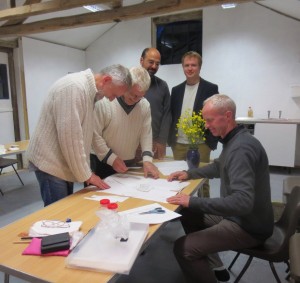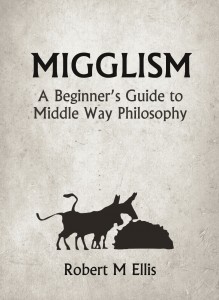The Middle Way Society’s summer retreat at Anybody’s Barn, Worcestershire, finished yesterday, and I hope that in a few weeks we can put up a page containing various comments from all the Retreatants. However, for the moment I thought I would just post some of my own reflections on it.
The retreat was the first one that has been organised by the society (as the 2013 Middle Way Study Retreat, when the society was founded, was organised by me privately). As such it is a bit of a test-bed, but I expect it to be the first of many (the next will be a weekend retreat in Sussex in November). The overall purpose was to provide a basic understanding of the Middle Way as an approach, combining talk and discussion with practice and allowing the practice to give a wider context to the discussion. So the programme contained two 45 minute meditation sessions (early morning and late afternoon), a couple of hours of talk and discussion (two sessions of about an hour or a bit longer), and a more practical or creative activity in the evening that might take one or two hours. In between there were meals and lots of free time for walks, socialising, naps, reading, or reflection. We had silence up until 10am each morning to provide a focused start to the day, but there was lots of informal discussion at other times.
I’d arrived at this programme by gradually adapting the model I had initially learned in Buddhist retreats and adapting it so that the Middle Way, rather than an adherence to a tradition of what retreats ought to be like, was the working principle. Balance is vital. For retreats to work, people do need to treat them as a special space, and drop everyday distractions such as their mobiles, TV etc, but on the other hand if people are forced into too much of a ‘disciplined’ mould by an excess of one kind of activity, this is liable to produce an unhelpful reaction. I wonder very much about the long term efficacy of extreme meditation retreats, where people do 8 hours of meditation or more, as though meditation was an end in itself and more of it is necessarily better. If one wants to integrate the effects of meditation into one’s life, I think one stands a lot more chance of doing this through integrated activity: though that doesn’t mean that MWS couldn’t run retreats in the future that put a bit more relative emphasis on meditation.
One thing I think I learned from the retreat is that events that one thinks might be very disruptive are not necessarily so, as long as people maintain commitment to the retreat space. Two people had to leave less than halfway through the retreat, and another stayed locally off the premises and had to come and go a lot because of their personal circumstances. On the rather rigid model of a retreat that I had absorbed from my experience of Buddhist retreats, such things would either just not be allowed, or be regarded as disastrous if they happened. But retreats are for people, not people for retreats. Although I didn’t initially set out intending to be quite as flexible as I ended up being about these ‘disruptions’, I ended up feeling that flexibility of this kind was an important part of the way that retreats need to address conditions for real, embodied people. Ordinary people have all sorts of needs and problems that retreats need to accommodate if they are to help them, rather than excluding people because of the fixed idea that a variation of the normal conditions must be seriously disruptive.
The retreat was relatively small (7 people), and only just financially viable (many thanks to Anybody’s Barn for being flexible with their charges), but if we can attract that many people to a successful week-long retreat after only a year of existence, I’m optimistic that we will rapidly gain more credibility and begin to run an increasing number of viable retreats. The people who came along were quite varied in age, outlook, and previous experience. However, a spirit of practising the Middle Way in handling any disagreements soon came to prevail, and by the end of the week (as often happens on retreats) we had all formed bonds of friendship. If you only came on a retreat to make friends, and that was your only motive, it would still be worthwhile. It’s also impressive how easily on retreat people often get down to handling practical activities (like washing up) in a straightforward and harmonious way.
One of my own major contributions to the retreat was the talks, and one of the other points of reflection I will take away from the retreat is to keep improving the way I handled these. My tendency is to be a bit too much motivated by an overall abstract view of what I am communicating, and to go on for slightly too long, because I think about the issues in a very synthetic way, and am also thinking a bit more about the importance of the material itself than of the needs of the embodied people I am addressing. I think I improved on this compared to 2013, as I kept most of the talks down to about 30 minutes – but there were still some that went on a little too much beyond this. I also need to be more thoroughly prepared with examples and engaging stories, as sometimes I still have to be prompted to provide these.
Nevertheless, the audience did seem to get a lot out of the talks. They have all been recorded and, as with the ones on the 2013 retreat, the plan is to put them up on the website in both audio form and augmented audio (i.e. with illustrative summaries and pictures in a video format). They were differently structured from the talks I gave in 2013, and included a lot more reference to cognitive biases, drawing on the work I have been doing on these recently. Compared to last year, they were also oriented less towards addressing Buddhist assumptions and more towards just offering a straightforward and practically-oriented account of each topic (though some of the questions in discussion did still involve the relationship with Buddhism). I made a point of ending each talk with specific points about the application to practice. The headings of the talks were as follows:
- Introducing the Middle Way
- Space and attention
- Embodied meaning
- Archetypes
- Self and ego
- Theories and ‘nature’
- Responsibility
- Value
- Authority
- Groups
- Time
- Practice
Even if you weren’t there, I’d be interested to hear any comments about your responses to the format and style of this retreat – i.e. how it sounds to you. I’m also very interested to hear any suggestions for future retreats that you would like MWS to run. For myself I finish convinced that retreats are the heart and blood of MWS. The internet is all very well for spreading ideas, but it is only by meeting face-to-face and encountering each other in greater depth that we can really start to make a positive impact on changing our lives using the Middle Way.
Picture: scene from the drawing class run on the retreat by Norma Smith (photo taken by her). Although this happens to show 5 men, note that there were also 2 women on the retreat!


